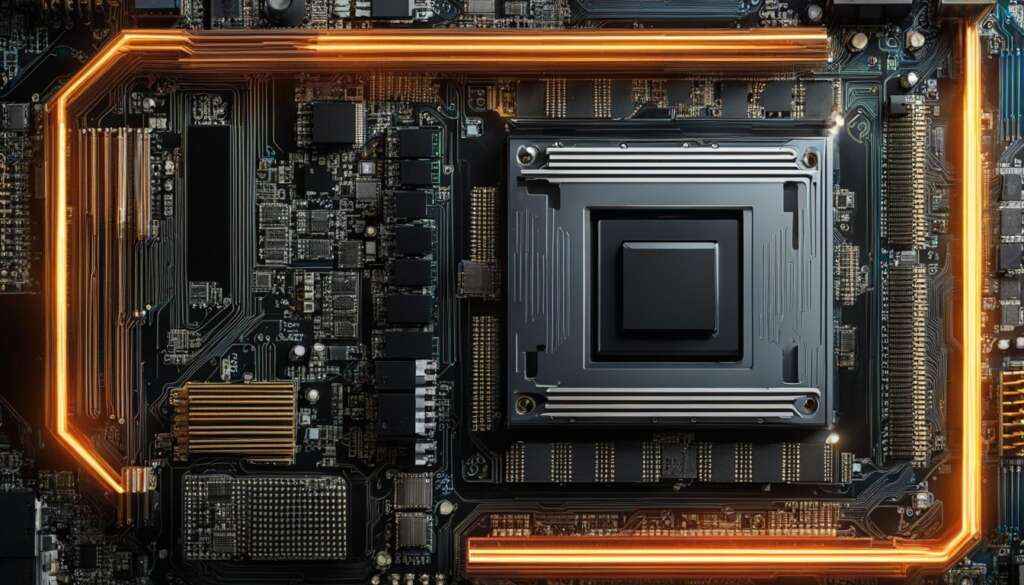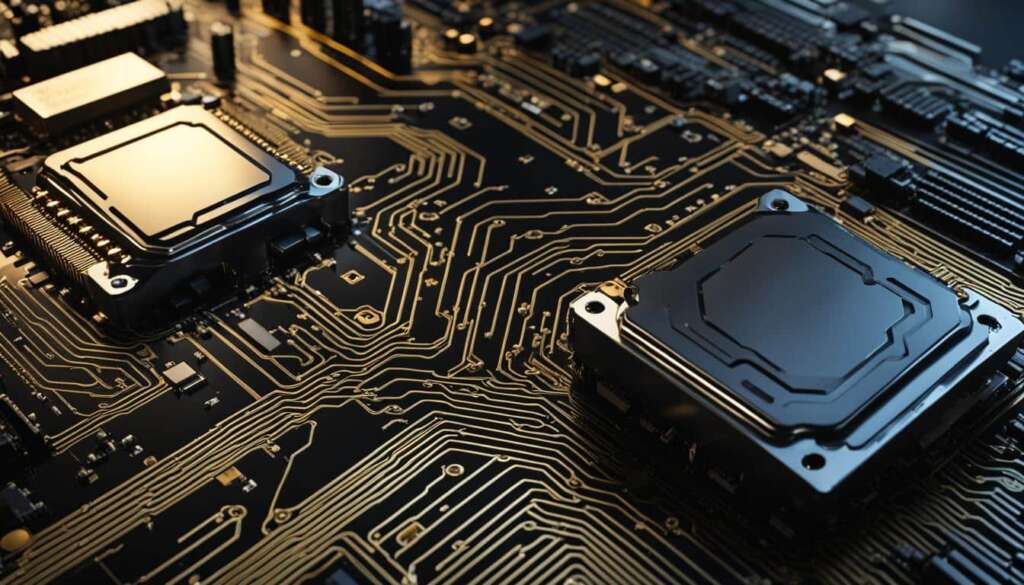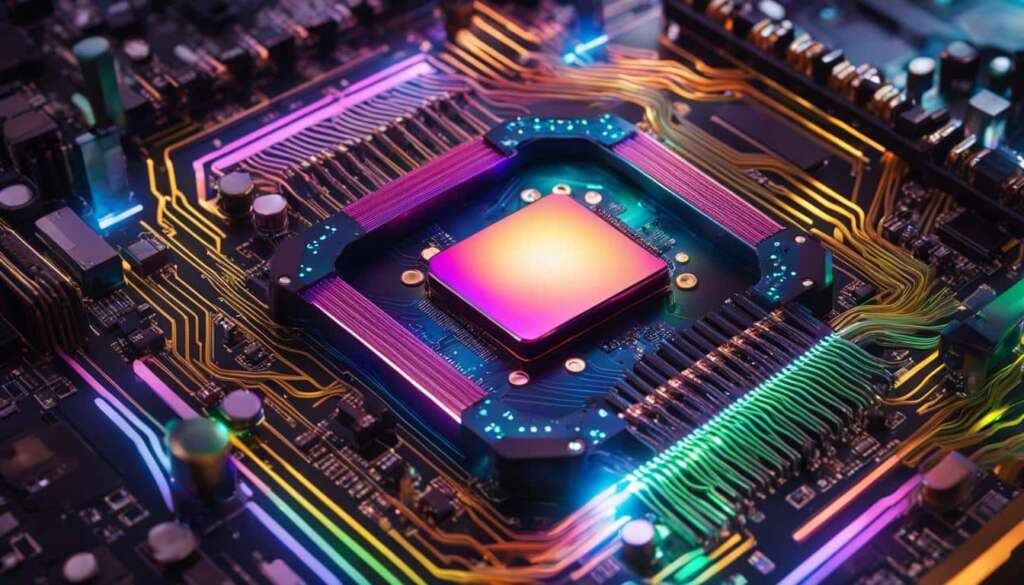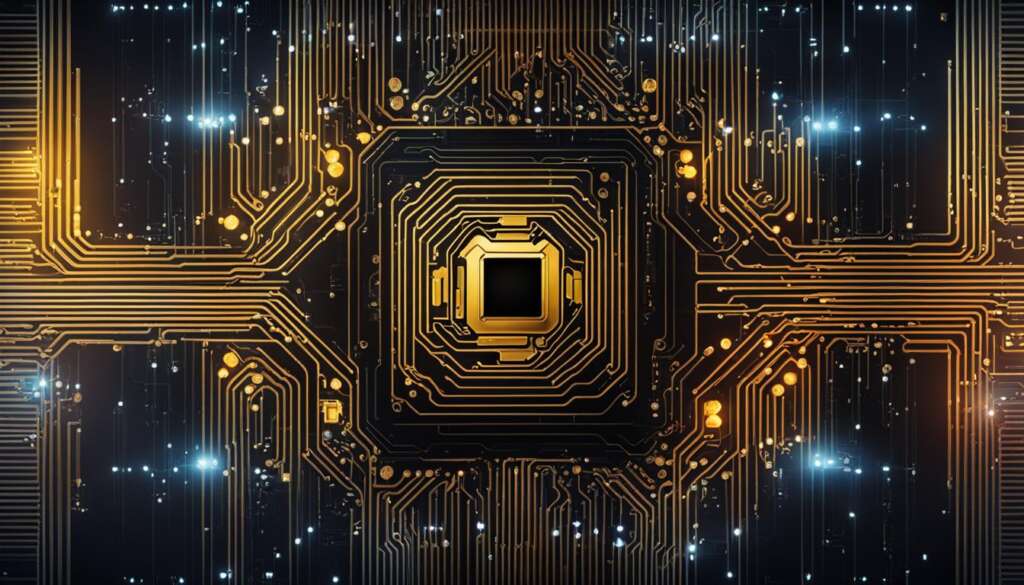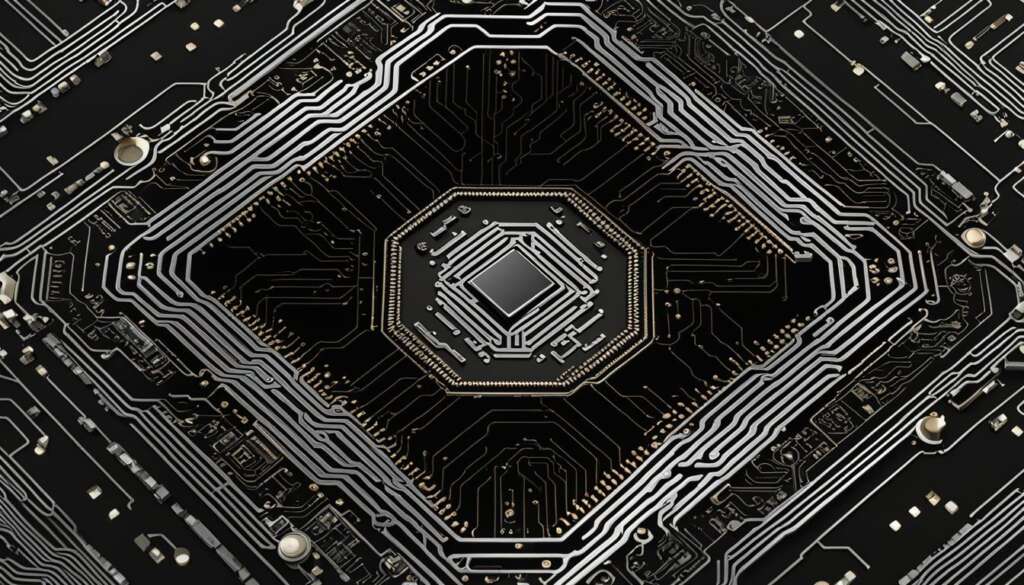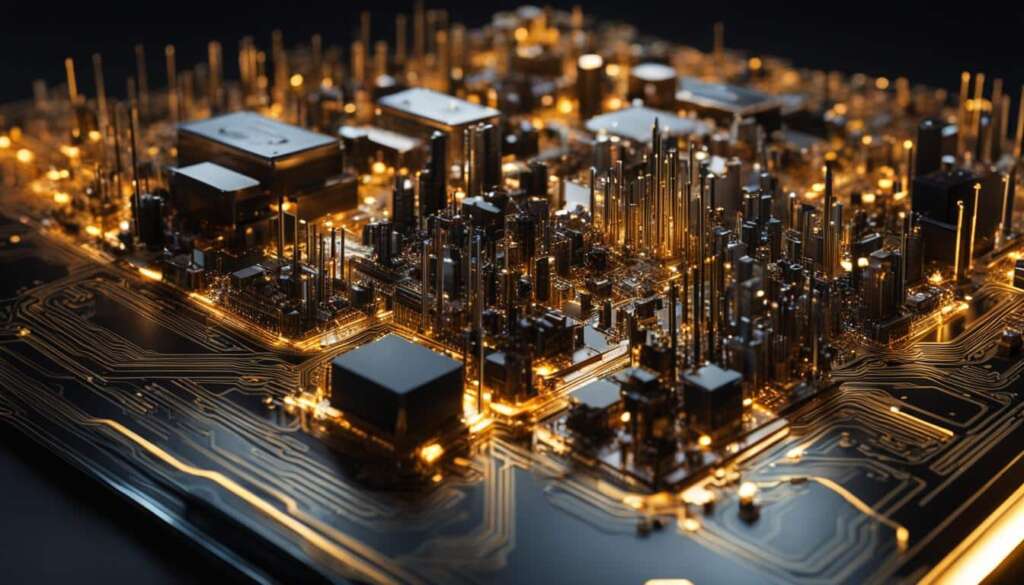Table of Contents
The central processing unit (CPU) plays a vital role in a computer’s performance. Acting as the brain of the system, the CPU guides the computer through the steps of solving a problem, executing instructions, performing arithmetic and logic operations, and controlling input/output processes. It coordinates the various components and ensures the smooth operation and efficient execution of tasks.
Key Takeaways:
- The CPU is the core component that guides the computer through problem-solving and execution of instructions.
- It performs arithmetic and logic operations, controls input/output operations, and coordinates with other hardware components.
- The CPU is often referred to as the brain of the computer due to its pivotal role in computer performance.
- Modern CPUs are made up of billions of microscopic transistors arranged on a single chip.
- The number of CPU cores and clock speed are important factors in CPU performance and cost.
What Makes a CPU a CPU?
A CPU, or central processing unit, is the most important processor in a computer. It is defined as a central processing unit and is responsible for performing various operations required by a computer program.
CPU Definition: A CPU is a silicon chip made up of billions of microscopic transistors arranged on a single chip. These transistors enable the CPU to perform the computations necessary for executing programs stored in the system’s memory.
The CPU is separate from the memory and graphics card but interacts with these components to perform tasks. In modern devices, CPUs can be standalone chips or part of a system on a chip (SoC) that packages the CPU alongside other components such as graphics chips and memory.
To better understand the structure of a CPU, refer to the visual representation below:
Components of a CPU:
| Component | Description |
|---|---|
| Control Unit | Manages the execution of instructions and directs the flow of data within the CPU and between the CPU and other hardware components. |
| Arithmetic Logic Unit (ALU) | Performs arithmetic and logical operations, such as addition, subtraction, multiplication, and comparison. |
| Registers | Temporary storage areas within the CPU that hold data used during processing. |
| Cache Memory | A high-speed memory integrated into the CPU that stores frequently accessed data for faster retrieval. |
In summary, a CPU is a fundamental component of a computer system that performs various operations required by computer programs. Its structure, consisting of a silicon chip with billions of microscopic transistors, enables it to execute instructions, perform arithmetic and logical operations, and control data flow within the computer. By understanding the components and functions of a CPU, users can appreciate its significance in driving a computer’s performance.
What Does a CPU Actually Do?
A CPU, or central processing unit, performs a series of essential functions in a computer system. These functions can be divided into three key stages: fetch, decode, and execute.
During the fetch stage, the CPU retrieves instructions from the computer’s memory. This process involves accessing the necessary data and commands stored in the memory for the CPU to carry out. Think of this stage as the CPU’s way of gathering the necessary ingredients to complete the task at hand.
In the decode stage, the CPU interprets the fetched instructions. It analyzes the information obtained from the previous stage to understand what actions need to be taken. This is where the CPU interprets the binary code and translates it into commands that it can execute.
Finally, in the execute stage, the CPU performs the specified calculations or operations. This is where the CPU carries out the required tasks based on the decoded instructions. These operations can include basic arithmetic calculations, logic operations, function execution, or data movement.
The CPU acts as a fast calculator, processing numbers and data to carry out tasks such as starting up the operating system, displaying videos, or performing complex calculations. It is responsible for executing arithmetic and logic operations, manipulating data, and making decisions based on the programmed instructions.
Additionally, the CPU communicates with other hardware components, such as the graphics card or solid-state drive, to transfer or process data as needed. This coordination ensures that data is moved efficiently between different components and that the entire system functions seamlessly.
“The CPU is like the conductor of an orchestra. It orchestrates the various components of a computer system, ensuring they work together harmoniously to deliver the desired result.”
Understanding the functions and capabilities of a CPU is crucial, as it enables users to make informed decisions when selecting the appropriate hardware for their needs.
The CPU’s Functions:
- Fetch instructions from memory
- Decode instructions to understand actions
- Perform arithmetic and logic operations
- Execute instructions
- Coordinate data movement with other hardware components
The next section will delve into the importance of CPU cores, clock speed, and their impact on performance and cost.
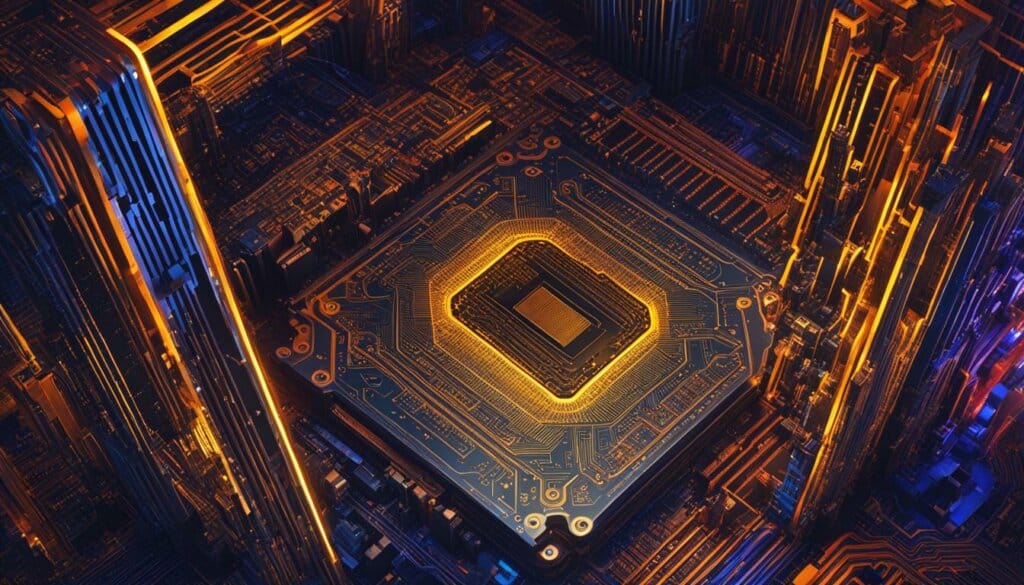
Cores, Clocks, and Costs
Modern CPUs have revolutionized computing by incorporating multiple cores, allowing for parallel processing and enhanced performance. Entry-level processors typically feature 2-4 cores, while more advanced models can boast 6-8 cores or even an impressive 32 cores. Additionally, some CPUs employ simultaneous multithreading technology, enabling a single core to handle multiple threads simultaneously, improving multitasking capabilities.
The clock speed of a CPU, measured in gigahertz (GHz), indicates the number of instructions it can handle per second. While higher clock speeds generally correlate with faster processors, other factors like architecture and generation also influence overall performance.
When choosing a CPU, it is crucial to strike a balance between performance and cost. Consider the specific requirements of your tasks to determine the optimal number of cores and clock speed needed. For general use, a CPU within the price range of $200-$300 will typically offer sufficient performance. However, if you require high-end gaming or video editing capabilities, investing in a more powerful CPU may be necessary for optimal performance.
In summary, modern CPUs with multiple cores and higher clock speeds offer improved performance and multitasking capabilities. However, when selecting a CPU, it is crucial to consider the requirements of your specific tasks and strike a balance between performance and cost.
Importance of the CPU
While the CPU’s importance for overall system performance has diminished in recent years, it still plays a crucial role in the response and speed of a computing device. The CPU is like the conductor of an orchestra, coordinating and directing the flow of information between different components of the system.
For gamers, higher clock speeds can translate to smoother gameplay and faster frame rates. A powerful CPU ensures that the demanding processing requirements of modern games are met, enabling a seamless gaming experience.
“When it comes to gaming, a high-performance CPU is essential. It not only impacts the frame rates and overall responsiveness of the system but also allows for smooth multitasking while gaming.”
On the other hand, professionals working with resource-intensive software such as CAD or video editing can benefit from CPUs with a higher core count. More cores allow for better multitasking and faster processing of complex calculations, enabling quicker rendering times and smoother editing workflows.
However, it’s important to remember that the CPU is just one piece of the puzzle. The overall performance of a system is influenced by various factors, including the amount of RAM, the speed of storage devices, and the performance capabilities of the graphics card.
Achieving a well-balanced system requires finding the right combination of components that work together seamlessly. This entails considering the specific requirements of your tasks, whether it’s gaming, content creation, or everyday computing.
Understanding the role of the CPU and its impact on overall system performance empowers users to make informed decisions when selecting computing hardware that suits their needs.
Benefits of a Balanced System
By ensuring a balanced system that takes into account not only the CPU but also the other integral components, users can experience:
- Smooth multitasking capabilities
- Faster program execution
- Reduced rendering and processing times
- Enhanced overall system performance
Choosing the Right CPU
When looking for a CPU, it’s essential to consider factors such as clock speed, core count, and budget. While higher clock speeds and more cores generally provide better performance, it’s crucial to strike a balance based on your specific needs and budget.
The table below provides an overview of the key considerations when choosing a CPU:
| Factor | Considerations |
|---|---|
| CPU Cores |
|
| Clock Speed |
|
| Budget |
|
Ultimately, a well-informed decision about the CPU and other hardware components will lead to a smoother and more efficient computing experience, tailored to your specific needs.
Conclusion
The central processing unit (CPU) is an essential component of a computer system, responsible for executing instructions, performing arithmetic and logic operations, and controlling input/output operations. It plays a vital role in ensuring smooth operation and efficient task execution by interacting with other hardware components.
While the overall importance of the CPU in system performance may have diminished over time, it still significantly impacts the speed and responsiveness of a computing device. Understanding the functions and capabilities of a CPU is crucial for making informed decisions when selecting the appropriate hardware.
By considering factors such as CPU core count, clock speed, and cost, users can strike a balance between performance and budget to meet their specific needs. It is important to remember that the CPU is just one component of a larger system, and other factors like RAM, storage speed, and graphics card performance also contribute to overall performance.
In summary, the CPU’s role as the central processing unit makes it an integral part of a computer system. Its functions and capabilities are essential for efficient task execution, and users should consider its specifications alongside other hardware components when making informed decisions. By understanding the importance and impact of the CPU, users can optimize their computing devices according to their requirements.
FAQ
What is the role of a CPU in a computer?
The CPU, or central processing unit, guides the computer through the steps of solving a problem, executes instructions of a computer program, performs arithmetic and logic operations, and controls input/output operations. It is often referred to as the brain of the computer as it coordinates the various components and drives computer performance.
What is a CPU and what does it do?
A CPU, or central processing unit, is the most important processor in a computer. It is a silicon chip that performs various operations required by a computer program. CPUs are made up of billions of microscopic transistors arranged on a single chip. They fetch, decode, and execute instructions stored in the memory and interact with other hardware components such as the ALU, control unit, and registers to perform tasks.
What functions does a CPU perform?
A CPU performs three key stages: fetch, decode, and execute. During the fetch stage, it retrieves instructions from the computer’s memory. In the decode stage, it interprets the fetched instructions to understand what actions to take. Finally, in the execute stage, it performs the specified calculations or operations. These operations can involve basic arithmetic, logic operations, function execution, or data movement.
What are CPU cores and clock speed?
Modern CPUs have multiple cores, which allow them to perform multiple instructions simultaneously. Entry-level processors typically have 2-4 cores, while more advanced models can have 6-8 cores or even up to 32 cores. Clock speed, measured in gigahertz (GHz), represents the number of instructions a CPU can handle per second. Higher clock speeds generally indicate faster processors, but other factors like architecture and generation also affect performance.
How important is the CPU for system performance?
While the importance of the CPU in overall system performance has decreased in recent years, it still plays a crucial role in the response and speed of a computing device. Factors like RAM, storage speed, and graphics card performance also impact overall performance. However, tasks such as gaming, CAD, and video editing can see improvements from higher CPU core counts.
What are the key takeaways about CPUs?
The CPU, or central processing unit, is the integral component of a computer system. It performs essential functions like fetching, decoding, and executing instructions, performing arithmetic and logic operations, and controlling input/output operations. By understanding the functions and capabilities of a CPU, users can make informed decisions when selecting the appropriate hardware for their needs.

